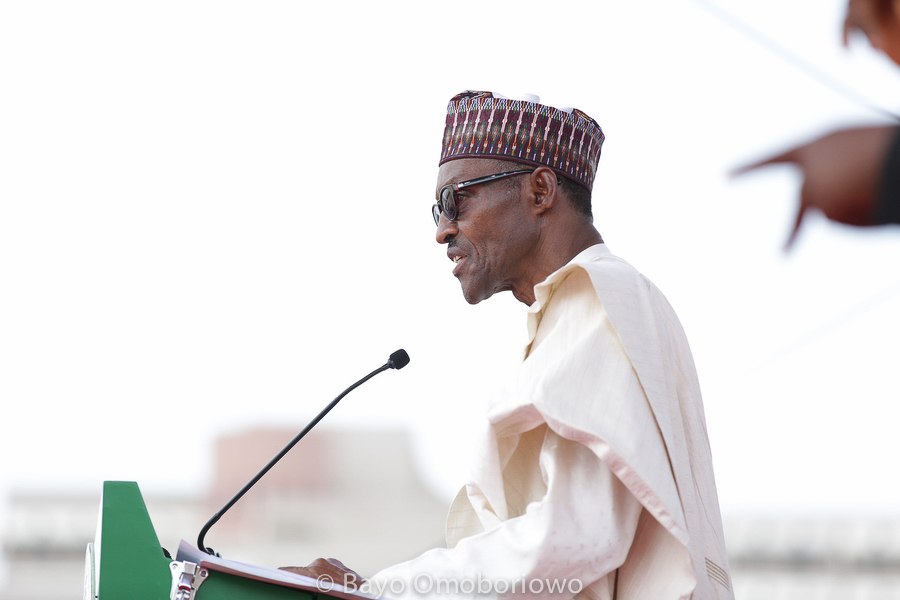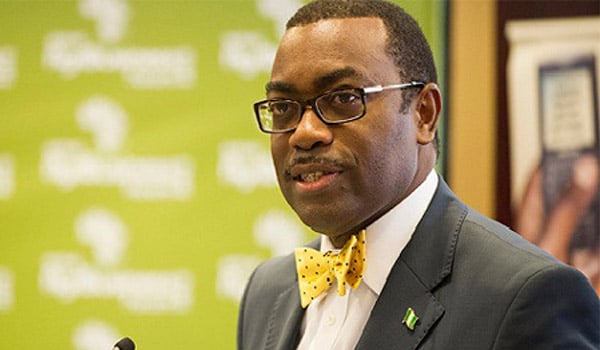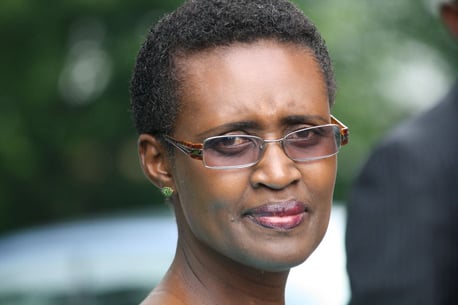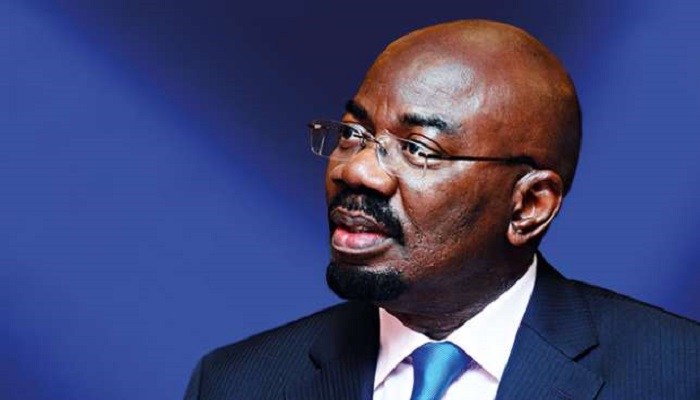Muhammadu Buhari giving his inaugural speech
Recently, a lady went to buy fuel at her neighbour’s station. She was allowed to jump the horrendous queue. Other motorists began to protest. One of them said: “All this nonsense will stop on May 29 when Baba becomes president. You people should continue to do whatever you like for now.” In seconds, the motorcyclists were chanting: “Sai Baba! Sai Baba! Sai Baba!” Buhari is, thankfully, not unaware of these huge expectations. Many see him as the messiah, the one who will liberate the country from decades of maladministration, corruption and indiscipline. He has been trying to cage these expectations in view of the enormous challenges ahead.
We need to understand this concept of “messiah” more tactically. The Jews, before the coming of Jesus Christ, were under the iron grip of Roman rule. They were expecting a messiah to come and set them free by launching an insurrection against the Roman empire, overthrowing Pilate and taking over power. They wanted a “political messiah”. But Jesus disappointed them by redefining messiahship as a spiritual assignment. He talked more about renewing their minds and preparing them for the kingdom of God — which he said, to their dismay, was not an earthly one. Needless to say they soon fell out with him and persecuted him to death.
Nigerians, likewise, have been waiting for a messiah since civil rule started in 1999. It is not as if our past presidents achieved absolutely nothing. President Olusegun Obasanjo, for all his faults and failings, oversaw the expansion of the economy, especially in oil and gas, telecoms, finance and agriculture. President Umaru Musa Yar’Adua, hurt by ill health, still initiated the Niger Delta amnesty. President Goodluck Jonathan, with all his inadequacies, presided over the expansion of rail, air, water and road infrastructure, agriculture and local content in the oil industry. But we know we are still very far from the promised land. We’ve only managed to cross the Red Sea in 16 years!
Going forward, I am tempted to ask: is Buhari the one who is to come or shall we wait for another? He has become president at a time of inescapable economic crunch. Crude oil price down. Revenue down. Naira down. Industrial production down. Debts up. We borrowed to pay for fuel subsidy. We borrowed to pay salaries. A prominent Nigerian economist told me recently that ongoing federal projects have a financing gap of about $54 billion. Where on earth will Buhari find the funds to complete them, much less initiate his own projects? Can we really borrow our way out of this fiscal crisis? Can we restructure the deformed economy without suffering more pains?
Advertisement
It would seem to me that many Nigerians are interested in a “political messiah” — a populist who will pay more attention to cleaning the political mess. Indeed, they would want him to fly economy class, shun Apple watch, ban siren, ensure we stay on queues and fire corrupt public officials. These, I would say, are the easiest part of the job. Public office has become synonymous with wasteful perks, obscenity and flamboyance. Any president who will stop travelling abroad with battalions of aides in a convoy of jets would certainly be well received by Nigerians. I can bet that Buhari would be much loved for his simple lifestyle. No doubt about that.
But the more difficult job would be reviving the economy. If Buhari is ever going to be an “economic messiah”, he is unlikely to be as popular as he is now. To start with, Buhari badly needs money to resolve the crises at hand. He may have to raise taxes like VAT, cut or stop subsidies as well as shrink public service overheads. He needs to raise resources to embark on programmes that will better the lives of Nigerians — particularly in infrastructure, security, education and healthcare. To put the economy in good shape, he will have to adopt measures that could bring more pains. Unfortunately, when Nigerians voted for him, they said they wanted “change” — not pains. Typically, Nigerians want “change without pains”.
As good Nigerians, we like the best of both worlds — we like to make “konko” without killing a frog. When Jonathan sought to deregulate fuel pricing in 2012, we brought the country to a halt. Even APC chieftains who campaigned for subsidy removal all their lives started playing politics. Jonathan’s political fortunes went into a spiral from then on. He never recovered from the damage. He was named “shoeless and clueless”. He had to reverse the decision. But who lost in the end? We have spent over N2 trillion on subsidy since then. Who gained? Go to our airports and count the private jets owned by oil merchants. Imagine what N2 trillion could have done for Nigeria!
Advertisement
There is nothing like painless change. There is always a price to pay. There is always sacrifice to be made. How many Nigerians are willing to live within their means henceforth? How many lawmakers, both state and federal, are ready to forgo some comfort? How many governors are willing to give up chartered flights? How many government contractors are ready to cut their insane profit margins? Are we willing to pay 10% VAT to help tackle the fiscal crisis? Are we willing to pay N130 per litre for petrol if pricing is deregulated? It is not enough to expect “change”: we should also be ready to give up something for “change”. But this is not what suffering Nigerians want to hear.
Ultimately, it is left to Buhari to decide the direction he wants to go. Strait is the gate and narrow is the way that leads to change. Only a few leaders find it and take it. It is a rough road. Wide is the gate and broad is the way that leads to stagnation and regression. Most Nigerian leaders prefer this cosy way. It is business as usual; it hardly hurts politically. But shall we continue in “cosy politics” and expect change to abound? Can we continue to do things the same way and expect a different result? We have to change our ways. Buhari has come with gigantic goodwill and if he does not utilise it to change the way things are done, then we are done for.
While goodwill is exhaustible, it is also replenishable. If he messes up with his goodwill through poor decisions, recovery will be difficult. Good and purposeful leadership, on the other hand, can replenish goodwill. Like I noted last week, Nigerians, to be fair, are not impossible to lead: all they desire is a sincere and committed leader who will lead from the front. Lagosians started celebrating Babatunde Fashola long before they saw any results. There was just something about Fashola that inspired the people, something that showed purposeful leadership even when he was taking tough decisions that hurt bus drivers and market women.
I should also add that austerity measures need not lead to political damage. A most recent example would be the UK. The Conservative Party narrowly won the 2010 election and could only form government in coalition with the Liberal Democrats. The economy was in ruins. The government embarked on fiscal tightening, making incredible cuts to spending on welfare and security. This move was very unpopular, but the UK economy was soon back on its feet and Britons were happy again. The reward came in May 2015 when the Conservatives were re-elected in a most convincing manner, trouncing the Labour Party.
Advertisement
The good news is that Buhari is not a novice in government. Although his experience was at a different era, leadership principles are essentially the same. Therefore, I will, in conclusion, invoke Tai Solarin’s ‘prayer’ on him: “May your road be rough! I am not cursing you… Our successes are conditioned by the amount of risk we are ready to take… You cannot make omelettes without breaking eggs. Throughout the world, there is no paean without pain… We do not achieve much in this country because we are all so scared of taking risks. We all want the smooth and well-paved roads… May your road be rough!”
AND FOUR OTHER THINGS…
DOUBLE DOSE
President Muhammadu Buhari is only the second person to rule Nigeria twice — after, who else, Olusegun Obasanjo. When Obasanjo won the 1999 presidential election, he became the first to rule Nigeria both as a soldier and as a civilian. His first stint was as military head of state from 1976 to 1979. He returned, via democracy, 20 years later. Buhari has now matched the feat. He was military head of state from 1983 to 1985 and returned 30 years later to win a presidential election. Generals Yakubu Gowon and Ibrahim Babangida made futile attempts to return as democratic leaders. Militicians.
SOUL MATES
Advertisement
When Buhari was military head of state, he was a major-general. His deputy was a brigadier — a certain Babatunde Idiagbon. However, when Idiagbon was promoted major-general, Buhari, interestingly, remained on his rank. At no other time in Nigeria’s history were the No. 1 and No. 2 on the same rank. Also, among all Nigeria’s military heads of state, only Buhari and JTU Aguiyi-Ironsi did not promote themselves to the rank of ful-star general. Sani Abacha was already a general when he came to power in 1993, while Obasanjo only became a four-star general shortly before his retirement in 1979. Spartan.
I SWEAR!
Advertisement
Buhari was sworn in by Justice Mahmoud Mohammed on Friday, but there was a mild drama when he became head of state on December 31, 1983. Justice George Sodeinde Sowemimo, then the chief justice of the federation (a title now known as chief justice of Nigeria), politely declined to swear in Buhari — apparently because of possible legitimacy issues following the overthrow of a democratic government. Sowemimo, I understand, asked Buhari to simply raise his right hand, recite the oaths of office and that would be it! Buhari nonetheless retained Sowemimo till his statutory retirement as chief justice in 1985. Large-hearted.
SNAKE AND LEADER
Advertisement
Buhari revealed a rare fact about himself in an interview I had with him at his Jabi residence, Kaduna, over 14 years ago. I asked him to tell me the pranks he played as a kid. He and his friends, he revealed, were fascinated by snakes. They used to sneak into the bush to play with the deadly reptile! Snake charmers are very common in northern Nigeria, but it is never a kid’s game. As Nigeria’s new leader, Buhari will have to charm or crush a lot of snakes around power. There are plenty of them in human skin. Courage.
Advertisement
7 comments







The journey of a thousand miles begins with a step. Pain or not. We’re on the right path.
We all wanted change because the level of corruption was at it’s peak in Nigeria.
Very optimistic that sacrifice or not we are heading in the right direction. Rome was not built in a day remember. Firs, custom and the other agencies where revenue is generated must open their books for proper accounting.
Hope is not lost.
Crude oil prices was this low when Obj was president. Yet he saved and paid the nation’s debt. Benin, Asaba and Warri roads were completed during his tenure among other projects.
It’s time we partner foreign investors to build our economy through PPP.
This is a lovely article. Mr Simon kindly seek audience with President Buhari and discuss these very important issues with him, am so sure he will be glad to hear from you. Secondly, we are all ready for sacrifices, because we are aware there can’t be gain without pain.
The article about Buhari is insightful and the tidbits interesting and revealing.’Hope he acts the “Economic Mesiah” rather than the political one. Well-meaning Nigerians will thank him for it regardless of the attendant hardship. They know things usually get worse before they get better. Indeed, they are counting it. Good job.
Apostle Paul Kolawole is Genius.
Insightul article from a committed Buharist.
I believe GMB is not he who is to come, and really need not be. If he can restore order to the society, that would be a solid platform for the future. (And) things are hardly as bad as they seem at first. The economy is in fairly good shape and only requires good managers/management at all levels. If GMB provides the enabling framework, things will look north pretty quickly. Nigerians are expectant and there is only one option: Success. Every Nigerian should join hands with GMB to make good things happen.
What an interesting article. The expectation of the average Nigerian for this new administration is indeed very high, but I’ll like to remind the average Nigerians that it will take at least another two years before this administrations policy impact begins to manifest. The economy has been completely balkanised and looted for the last 16yrs of succeeding governments.